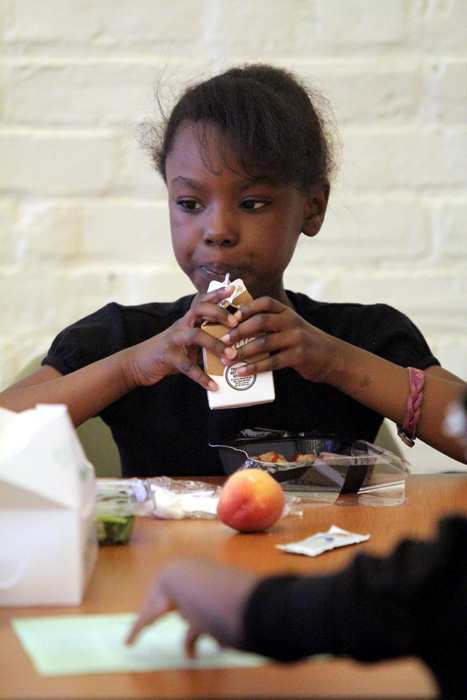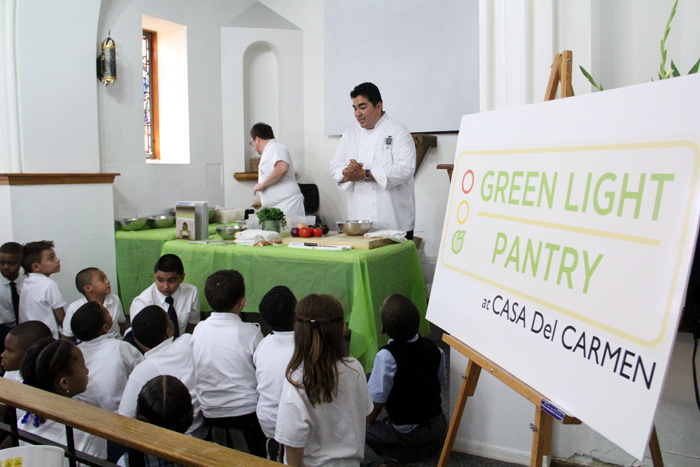With a full endorsement by Archbishop Charles Chaput, Nutritional Development Services (NDS) of the Archdiocese of Philadelphia has kicked off a $400,000 fundraising campaign to meet its current needs.
A fair question is, why is a campaign necessary at a time when the federal government is trumpeting a healthier labor climate?
Actually it is very necessary.
[hotblock]
It’s nice that according to the U.S Bureau of Labor Statistics, unemployment dropped to 7 percent in November with 203,000 new jobs added to the economy. It’s not so nice if you are one of the almost 11 million people still unemployed or one of the many millions more who are underemployed or making less than a living wage.
No one can seriously make the case for a $7.25 hourly federal minimum wage being sufficient to feed an individual let alone a family. The fact is, over the last 40 years or so the minimum wage has not kept up with inflation, and given the intransigence of Congress the wage rate is slipping further and further behind.
It is true that low-income families can receive federal SNAP benefits (Supplemental Nutritional Assistance Program, formerly known as food stamps). But that too has not kept pace with inflation, especially with the current expiration of the emergency temporary increase given at the height of the recent economic recession that will pare $5 billion from the SNAP allocation, along with uncertainty due to proposed cuts in the upcoming Farm Bill.
It is left to private agencies to take up the slack, and in the local Catholic community that means Nutritional Development Services, Catholic Social Services’ county-based Family Service Centers and individual parish food cupboards.
(See a related story on the Philadelphia Archdiocese’s local response to hunger: Even in wealthy county, poor people struggle for food)

A girl enjoys a healthy snack including low-fat milk and fruit as part of the Summer Feeding Program of Nutritional Development Services’ Community Food Program. (Sarah Webb)
“These cuts will seriously impact the Greater Philadelphia region,” Archbishop Chaput wrote in a letter to support the NDS fund drive. “Our own Nutritional Development Services (NDS) is realizing the impact of these cuts with increased call for food by the food cupboards to which it supplies non-perishable food each month.
“Without an increase in financial resources, NDS will need to decrease the amount of food delivered to the food pantries of Catholic Social Services and the many parishes in the Archdiocese of Philadelphia. Thousands of families and senior citizens rely on these food pantries during the winter.”
(To make a donation to the campaign, visit the website of the Catholic Charities Appeal and click on the “Donate Today” button. Then select the Nutritional Development Services option from the Gift Restriction menu, and pledge a gift amount using a credit card or through a checking account.)
The Community Food Program of NDS partners with parishes, schools, business and community groups to collect and distribute non-perishable food to over 40 food cupboards across the five-county Philadelphia Archdiocese, according to Lorraine Knight, the director of NDS. Increasingly, it isn’t just non-perishable items.
“This special appeal for the Community Food Program of NDS will enable us to provide fruits, vegetables and dairy products,” she said. “These items will improve the nutritional value of the food the families and individuals who utilize the cupboards will receive.”
NDS “approaches the work of collecting and distributing food as our response to the Gospel mandate to feed the hungry in our midst,” Knight said.
Going beyond meeting these most immediate needs, one of the things NDS would like to be able to do is to assist the food cupboards to obtain the necessary refrigeration that will enable them to supply non-perishables, according to Anne Ayella, assistant director of NDS.
“A lot of the food cupboards are going to a choice model,” she explained. “When people come in, rather than give them a pre-packed bag packed by volunteers, the food will be arranged in sections. Here are the grains, here are the veggies, and here are the fruits. You pick the food you think your family would eat the most of.”
This is important became some people might have allergies to certain foods or dietary restrictions for health reasons, or even cultural differences, especially among immigrant families.
Because of a historic reliance on non-perishables, the typical offerings of food cupboards in the past were not an especially healthy diet.
“If the campaign is really successful, we would like to buy more refrigeration for the cupboards and stock them with fresh product – milk, eggs, fruit and veggies, lean cuts of meat and fish. That is definitely a wish list,” Ayella said.
PREVIOUS: Even in wealthy county, poor people struggle for food
NEXT: It’s about time: Kairos retreat open to public school students, home schoolers




Exactly what percentage of our donation will go to directly to purchasing food for NDS?